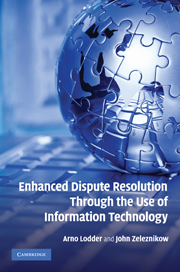Book contents
- Frontmatter
- Contents
- Preface
- 1 Introduction
- 2 Norms for the use of technology in dispute resolution
- 3 Developing dispute resolution processes
- 4 Technologies for supporting dispute resolution
- 5 Advanced intelligent technologies for dispute resolution
- 6 A three-step model for Online Dispute Resolution
- 7 Future prospects
- Glossary
- Bibliography
- Index
1 - Introduction
Published online by Cambridge University Press: 04 August 2010
- Frontmatter
- Contents
- Preface
- 1 Introduction
- 2 Norms for the use of technology in dispute resolution
- 3 Developing dispute resolution processes
- 4 Technologies for supporting dispute resolution
- 5 Advanced intelligent technologies for dispute resolution
- 6 A three-step model for Online Dispute Resolution
- 7 Future prospects
- Glossary
- Bibliography
- Index
Summary
Fundamentals of dispute resolution
One can argue that the resolution of disputes is one of the earliest forms of human endeavour. For example, Moses supposedly descended from Mount Sinai with the Ten Commandments and the 613 laws that can be found in the Torah. In addition to providing a framework in which Jews were to lead their life, these laws also gave guidance on how Jews should resolve disputes. But the resolution of disputes and disagreements occurred well before any biblical tracts existed. One such example is the admittedly very informal, but taken from the Torah, dialogue (or negotiation) between Abraham and God regarding criteria for the destruction of Sodom and Gomorrah. Obviously, people realised the importance of resolving disputes long before state-organised litigation originated.
Litigation has a long tradition, and is characterised by its formality and legal safeguards. Judges should be impartial and independent, and legal procedural law should guarantee the processes to be fair (cf., for example, fair-trial principle of Article 8 European Convention on Human Rights). In particular businesses often need faster outcomes than litigation can provide, and want the procedures to be confidential, whereas one of the principles underlying litigation is public hearing. Therefore, for more than a century arbitration has been used to resolve (international) disputes.
More recently, modern alternatives to litigation were heavily influenced by the National Conference on the Causes of Popular Dissatisfaction with the Administration of Justice, which took place in Minneapolis, Minnesota, from 7–9 April 1976.
- Type
- Chapter
- Information
- Publisher: Cambridge University PressPrint publication year: 2010



